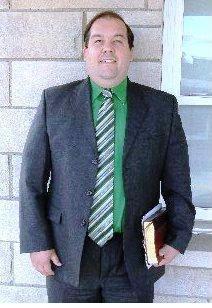Jarrod Jacobs: The Silence of God: Restrictive or Permissive?
We have learned in recent weeks about the Old Testament’s teaching concerning the silence of the Scripture. We saw that in the Old Testament, when God was silent, then this meant that the people could not act. God’s silence was restrictive! Just as the Old Testament teaches us that we cannot act when God is silent, so also the New Testament teaches us the same thing. For instance, we know that no angel is God’s son. We know this because the Hebrew writer asks, “For unto which of the angels said he at any time, ‘Thou art my Son, this day have I begotten thee?’ And again, ‘I will be to him a Father, and he shall be to me a Son?’ And again, when he bringeth in the firstbegotten into the world, he saith, ‘And let all the angels of God worship him’. And of the angels he saith, ‘Who maketh his angels spirits, and his ministers a flame of fire.’” The answer to the question is in the text! “But unto the Son he saith, ‘Thy throne, O God, is for ever and ever: a sceptre of righteousness is the sceptre of thy kingdom’” (Heb. 1:8-14).
In other words, no angel is God’s Son because God only said the above things to His Son! At the same time, He did not say these things to Christ and then state, “Now, I am not talking about any angelic beings.” God did not have to say it like that because by His silence, the angels understood those things were not meant for them! The angels were restricted from being considered God’s firstborn, having a scepter, or having a kingdom. Yet, it was not because God specifically told the angels “No,” but because He was silent toward them in this matter. Hebrews one shows us that God’s silence restricts!
In Hebrews 7:12-14, we learn that without a change of the law, Christ could not be a priest. Why? “For it is evident that our Lord sprang out of Juda; of which tribe Moses spake nothing concerning priesthood.” In the Old Testament, God specifically named the tribe of Levi as the priestly tribe (Num. 18:1-24). In so doing, He did not have to name all the other tribes and say, “Not you!” By His silence, those tribes knew they were restricted or prohibited from serving as priests. Since God was silent about authorizing priests from the tribe of Judah, the Hebrew writer makes it plain that Christ could not be a priest on earth. It demanded a change of the law for this to take place. Therefore, the law has changed, and we today are under the New Testament, the New Covenant, and not the Old, and Christ is a “high priest forever after the order of Melchizedek” (Heb. 5:10, 6:20, 7:17, 21).
Last, when the Jews disputed over whether Gentiles could be saved without physical circumcision, God’s silence settled the matter once and for all (Acts 15:7-15, 24). The fact that God’s silence prohibits man’s actions is made clear throughout the Scripture. Shame on anyone who says otherwise.
It is for these reasons that it is not wise to say, “God didn’t say not to do it.” Instead, we ask where is God’s authority (Col. 3:17). Let us be satisfied with what God has said and not delve into God’s silence (Deut. 29:29)!
-- You are invited to visit with the Caneyville church of Christ. Times of services: Sun.: 10:00 am, 10:45 am, 5:00 pm; Wed.: 7:00 pm. Website: http://caneyvillechurchofchrist.com Tune in to our radio program 101.5 FM at 5:30 am, Mon-Fri. Questions? Call: (270) 589-4167



























